Human Rights Assessment
3. Human Rights in Canada – Full Finding
Key message
The assessment of the human rights situation for the Mary River mine begins with a review of how government protects human rights in Canada. According to the UN Guiding Principles on Business and Human Rights, governments must protect against human rights abuse within their territory, including by companies. This requires taking steps to prevent, investigate, punish and redress such abuse through effective policies, legislation, regulations and adjudication.
Overview
Canada is a signatory to most international human rights treaties. Even though it was initially opposed to the UN Declaration on the Rights of Indigenous Peoples, it now supports it. Canada also supports international human rights standards related to business and human rights. At the same time, Canada is aggressively pursuing resource development (in Canada and around the world) as part of its economic strategy. Canada needs to ensure that its resource development strategy does not contradict human rights.
Within Canada, human rights are protected by the Constitution, the Charter of Rights and Freedoms, and provincial or territorial human rights laws. Furthermore, the Canadian Constitution and modern land claims agreements provide a strong protection of aboriginal rights in Canada.
In Nunavut, the protection of collective Inuit rights is assured by the Nunavut Land Claims Agreement. There is also a Nunavut Human Rights Act that protects Nunavummiut against discrimination and creates the Nunavut Human Rights Tribunal. In a recent report to the Government of Nunavut, it was recommended that it create a new human rights commission to provide better protection for and education about human rights in Nunavut.
While there are strong legal protections for human rights in Canada, important challenges remain with respect to implementation of both Inuit and human rights in Nunavut, including:
• Poverty and lack of economic and employment opportunities affect the realization of economic and social rights in Inuit communities.
• The remote location, lack of infrastructure and high cost of food and services affect the right to food, the right to housing and the right to health of many individuals and families.
• The territorial and local governments lack resources to fully implement their human rights obligations.
• There are gaps in terms of access to remedies as Nunavut does not have a human rights commission, and there are significant barriers for Inuit using the legal system.
It is against this backdrop that the Baffinland company must ensure that its operations do not harm the human rights of Nunavummiut.
International Standards: State obligation to protect human rights in accordance with the UN Guiding Principles on Business and Human Rights
1. States must protect against human rights abuse within their territory and/or jurisdiction by third parties, including business enterprises. This requires taking appropriate steps to prevent, investigate, punish and redress such abuse through effective policies, legislation, regulations and adjudication.
Commentary
States’ international human rights law obligations require that they respect, protect and fulfil the human rights of individuals within their territory and/ or jurisdiction. This includes the duty to protect against human rights abuse by third parties, including business enterprises.
The State duty to protect is a standard of conduct. Therefore, States are not per se responsible for human rights abuse by private actors. However, States may breach their international human rights law obligations where such abuse can be attributed to them, or where they fail to take appropriate steps to prevent, investigate, punish and redress private actors’ abuse. While States generally have discretion in deciding upon these steps, they should consider the full range of permissible preventative and remedial measures, including policies, legislation, regulations and adjudication. States also have the duty to protect and promote the rule of law, including by taking measures to ensure equality before the law, fairness in its application, and by providing for adequate accountability, legal certainty, and procedural and legal transparency.
2. States should set out clearly the expectation that all business enterprises domiciled in their territory and/or jurisdiction respect human rights throughout their operations.
Commentary
At present States are not generally required under international human rights law to regulate the extraterritorial activities of businesses domiciled in their territory and/or jurisdiction. Nor are they generally prohibited from doing so, provided there is a recognized jurisdictional basis. Within these parameters some human rights treaty bodies recommend that home States take steps to prevent abuse abroad by business enterprises within their jurisdiction.
There are strong policy reasons for home States to set out clearly the expectation that businesses respect human rights abroad, especially where the State itself is involved in or supports those businesses. The reasons include ensuring predictability for business enterprises by providing coherent and consistent messages, and preserving the State’s own reputation.
States have adopted a range of approaches in this regard. Some are domestic measures with extraterritorial implications. Examples include requirements on “parent” companies to report on the global operations of the entire enterprise; multilateral soft-law instruments such as the Guidelines for Multinational Enterprises of the Organisation for Economic Co-operation and Development; and performance standards required by institutions that support overseas investments. Other approaches amount to direct extraterritorial legislation and enforcement. This includes criminal regimes that allow for prosecutions based on the nationality of the perpetrator no matter where the offence occurs. Various factors may contribute to the perceived and actual reasonableness of States’ actions, for example whether they are grounded in multilateral agreement.
3. In meeting their duty to protect, States should:
(a) Enforce laws that are aimed at, or have the effect of, requiring business enterprises to respect human rights, and periodically to assess the adequacy of such laws and address any gaps;
(b) Ensure that other laws and policies governing the creation and ongoing operation of business enterprises, such as corporate law, do not constrain but enable business respect for human rights;
(c) Provide effective guidance to business enterprises on how to respect human rights throughout their operations;
(d) Encourage, and where appropriate require, business enterprises to communicate how they address their human rights impacts.
Commentary
States should not assume that businesses invariably prefer, or benefit from, State inaction, and they should consider a smart mix of measures – national and international, mandatory and voluntary – to foster business respect for human rights.
The failure to enforce existing laws that directly or indirectly regulate business respect for human rights is often a significant legal gap in State practice. Such laws might range from non-discrimination and labour laws to environmental, property, privacy and anti-bribery laws. Therefore, it is important for States to consider whether such laws are currently being enforced effectively, and if not, why this is the case and what measures may reasonably correct the situation.
It is equally important for States to review whether these laws provide the necessary coverage in light of evolving circumstances and whether, together with relevant policies, they provide an environment conducive to business respect for human rights. For example, greater clarity in some areas of law and policy, such as those governing access to land, including entitlements in relation to ownership or use of land, is often necessary to protect both rights-holders and business enterprises.
Laws and policies that govern the creation and ongoing operation of business enterprises, such as corporate and securities laws, directly shape business behaviour. Yet their implications for human rights remain poorly understood. For example, there is a lack of clarity in corporate and securities law regarding what companies and their officers are permitted, let alone required, to do regarding human rights. Laws and policies in this area should provide sufficient guidance to enable enterprises to respect human rights, with due regard to the role of existing governance structures such as corporate boards.
Guidance to business enterprises on respecting human rights should indicate expected outcomes and help share best practices. It should advise on appropriate methods, including human rights due diligence, and how to consider effectively issues of gender, vulnerability and/or marginalization, recognizing the specific challenges that may be faced by indigenous peoples, women, national or ethnic minorities, religious and linguistic minorities, children, persons with disabilities, and migrant workers and their families.
National human rights institutions that comply with the Paris Principles have an important role to play in helping States identify whether relevant laws are aligned with their human rights obligations and are being effectively enforced, and in providing guidance on human rights also to business enterprises and other non-State actors.
Communication by business enterprises on how they address their human rights impacts can range from informal engagement with affected stakeholders to formal public reporting. State encouragement of, or where appropriate requirements for, such communication are important in fostering respect for human rights by business enterprises. Incentives to communicate adequate information could include provisions to give weight to such self-reporting in the event of any judicial or administrative proceeding. A requirement to communicate can be particularly appropriate where the nature of business operations or operating contexts pose a significant risk to human rights. Policies or laws in this area can usefully clarify what and how businesses should communicate, helping to ensure both the accessibility and accuracy of communications.
Any stipulation of what would constitute adequate communication should take into account risks that it may pose to the safety and security of individuals and facilities; legitimate requirements of commercial confidentiality; and variations in companies’ size and structures.
Financial reporting requirements should clarify that human rights impacts in some instances may be “material” or “significant” to the economic performance of the business enterprise.
Human Rights Protections in Canada
The following table outlines some of the main human rights protections in Canada in relation to the main issues addressed in HRIA methodologies. Additional information about priority issues is provided in the other key findings.
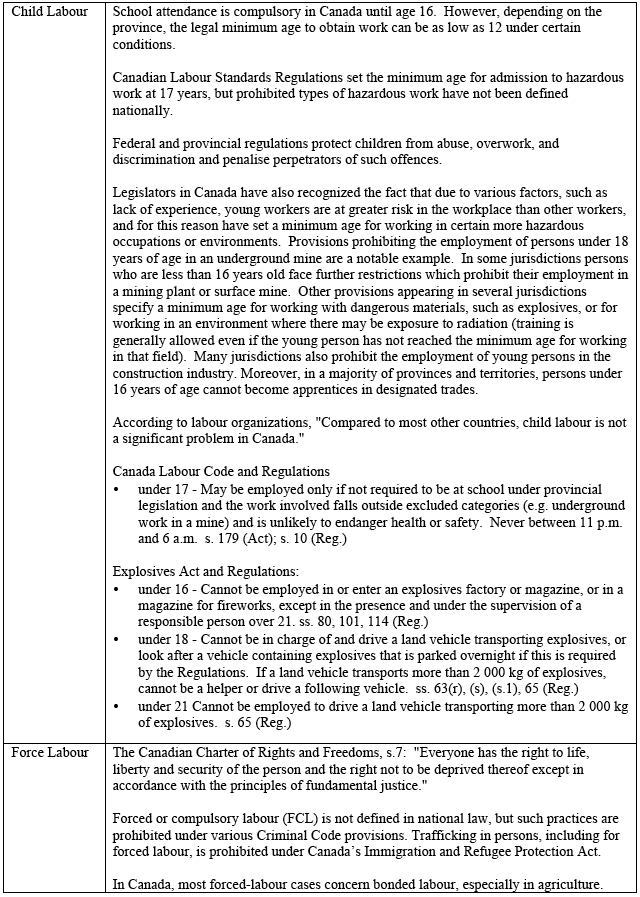
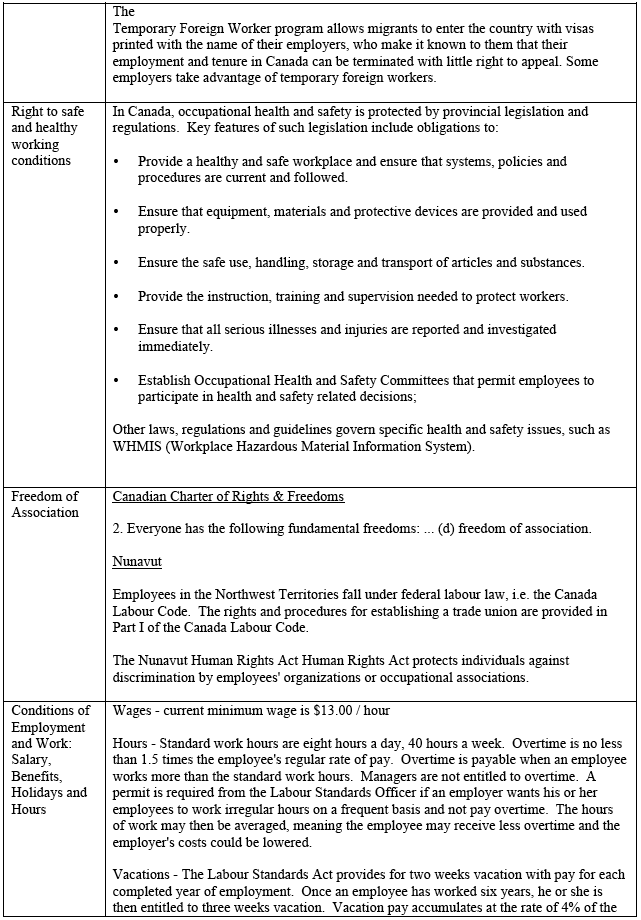
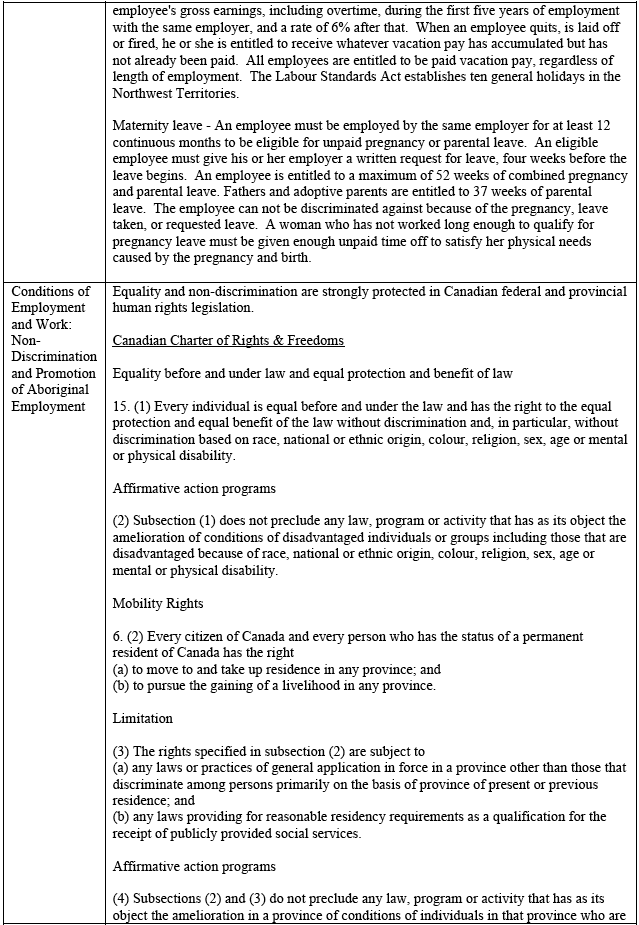
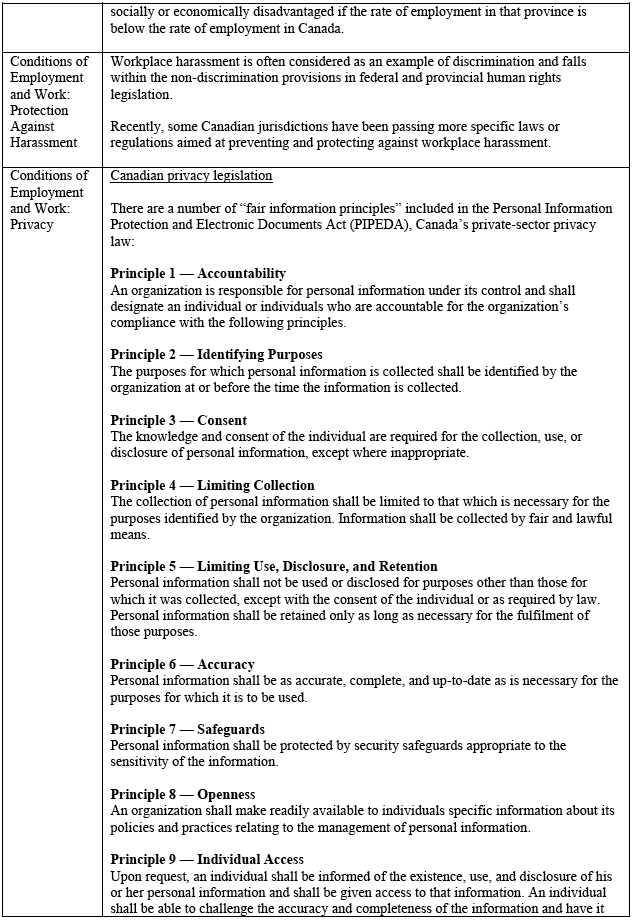
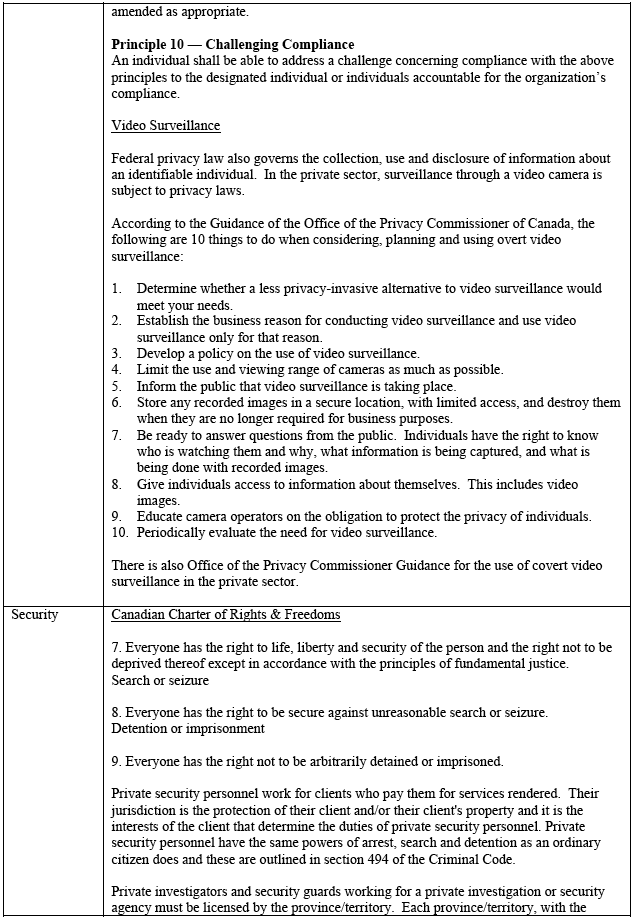
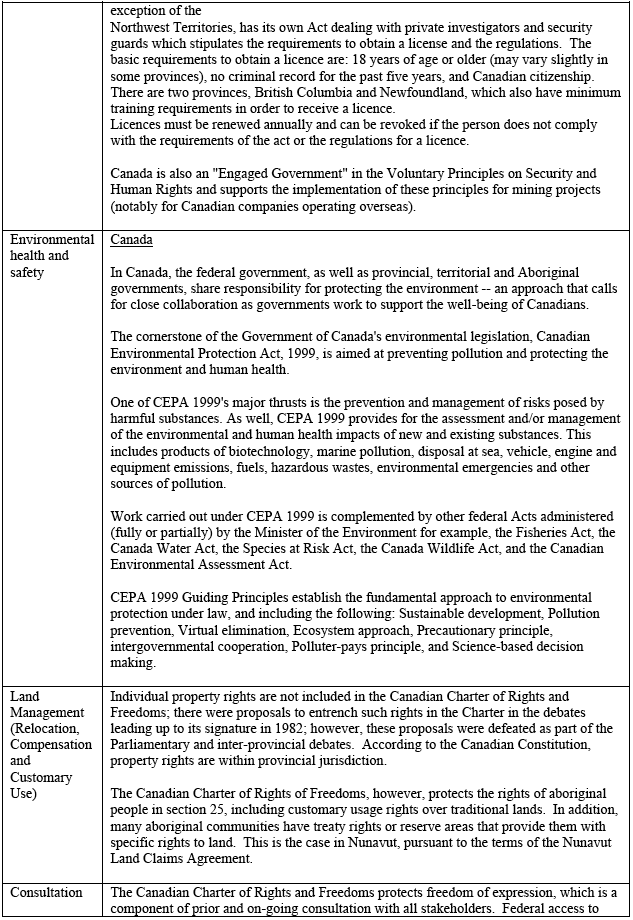
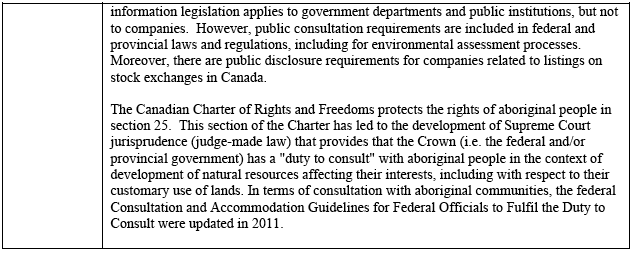


 Hear the summary in Inuktitut
Hear the summary in Inuktitut
 Download the summary in PDF format
Download the summary in PDF format